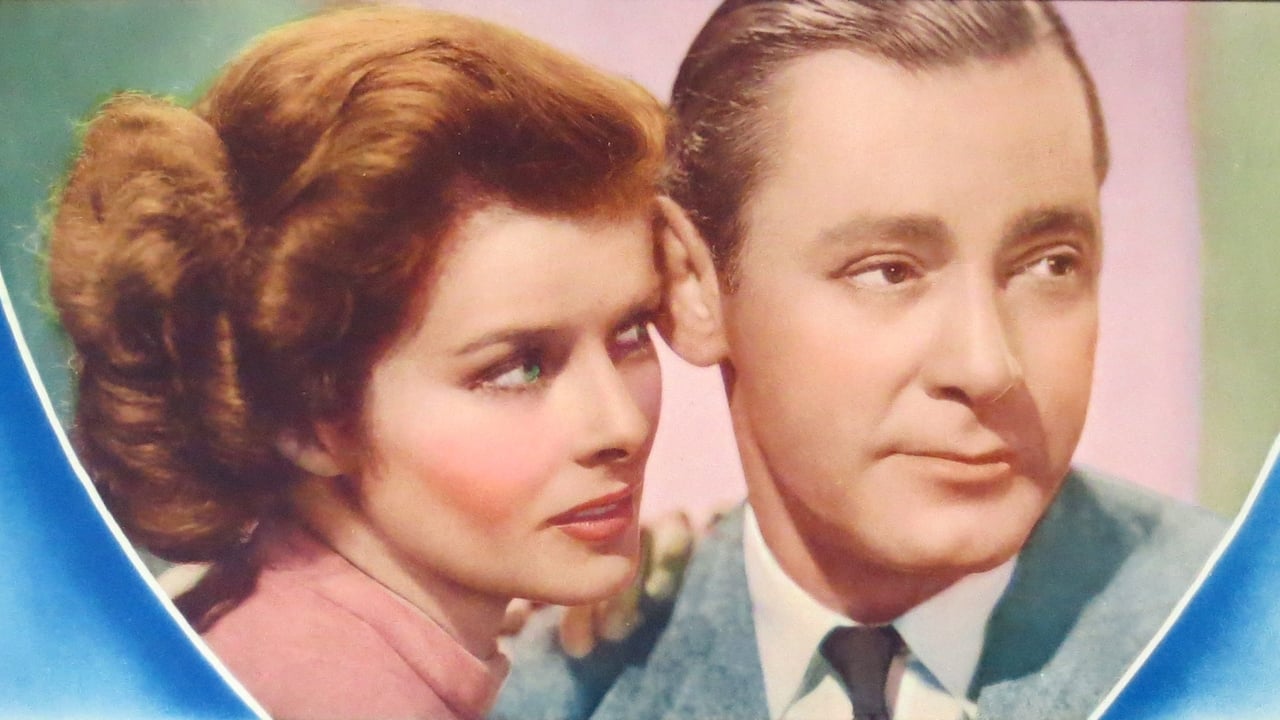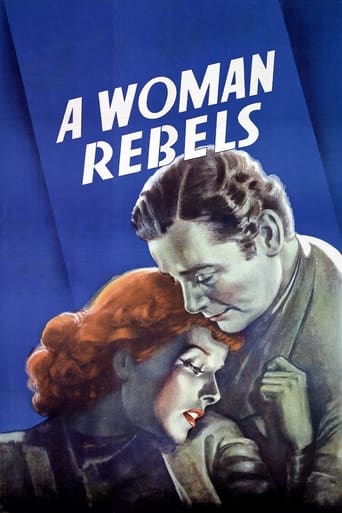Redwarmin
This movie is the proof that the world is becoming a sick and dumb place
Majorthebys
Charming and brutal
Spoonatects
Am i the only one who thinks........Average?
Beystiman
It's fun, it's light, [but] it has a hard time when its tries to get heavy.
mark.waltz
This isn't a great movie by any means, but for what it is, "A Woman Rebels" is very interesting and of interest to cinema buffs, feminists and history students. It is a picture of the changing perceptions of women in society, and who better to be the star of such a film as the very independent Katharine Hepburn? Hepburn and Elizabeth Allan ("A Tale of Two Cities", "David Copperfield") are sisters as different as night and day, and this is of great concern to their very strict widowed father (Donald Crisp). Their very prickly companion (Eily Malyon) reports them for offenses which brings Crisp's wrath down upon the two girls. Only the devoted Lucille Watson shows them any compassion, a role she will continue to film throughout the film as the only mother-like figure they've known since their own mother died. Hepburn falls in love with rebel Van Heflin and Allan marries the stable David Manners, but tragedy strikes when Hepburn visits her sister in Italy. Now left to raise a child she claims is her sister's, Hepburn returns home, and instead of fighting with her father becomes an independent woman and begins a career, originally without pay and with a male pseudonym, on a women's magazine which until she came along printed nothing but domestic articles on subjects no more confidential than needlepoint.Only two years after the production code came in, this film dared to cover the subject of unwed mothers with dignity and class. Even though it never mentions it, the subject is obvious, particularly with a young woman who visits Hepburn at the newspaper to get help for her ailing child, only to send her a cryptic letter later with tragic overtones. "Shame!" Hepburn screams at society in her column, ripping up the oh-so important story on needlepoint, "a career for respectable women", the print-out insinuates. Hepburn continues to raise her niece alone, keeping secrets when the young girl begins to date Heflin's grown son and becomes involved in scandal brought out by his vindictive wife.Along the way, Hepburn meets the dashing Herbert Marshall who stands by her through thick and thin. Their first encounter is hysterically funny as the stubborn Hepburn finds herself an adversary in a non-moving mule. Who do you think will win this battle? Crisp disappears for much of the second half of the film, but when he returns for a conclusion to the shattered father/daughter relationship, it is heartfelt and emotional, helping you understand the hardness of the patriarch of an earlier generation who simply didn't know how to bring girls up alone in a masculine dominated era.
lugonian
A WOMAN REBELS (RKO Radio, 1936), directed by Mark Sandrich, from the novel "Portrait of a Rebel" by Netta Syrett, offers Katharine Hepburn the type of role most suited for both her talents and personal interests, that of a feminist fighting for equal rights. Rather than a biography about early fighters of the feminist movements as Virginia Wolfe or Susan B. Anthony, A WOMAN REBELS takes a look at a fictional character named Pamela Thistlewaite.The story, set in "England, the middle of the Victorian era," introduces Pamela Thistlewaite (Katharine Hepburn), and her younger sister, Flora (Elizabeth Allen), living in Gideon Gray estate with her widowed father, Judge Thistlewaite (Donald Crisp) and humble Aunt Betty Bumble (Lucile Watson). Tutored by their governess, Piper (Eily Malyon), Pamela, with her thirst for knowledge, questions authority to why "women are inferior to men." Because of her outspokenness towards her disciplinarian father ("If you are unjust as a father, you must be equally unjust as a judge"), Thistlewaite decides to have his daughters introduced to society where they are to meet young men as prospect husbands. During a gathering, Flora meets and falls in love with sailor, Captain Alan Craig Freeland (David Manners), whom she marries and settles to Italy. As for Pamela, she encounters Gerald Waring Gaythorne (Van Heflin) with whom she becomes interested. Meeting secretly in England at Madame Tussand and Sons Exhibition Wax Works, they eventually have an affair before Pamela learns too late that Gerald is married. Keeping her pregnancy a secret, Pamela, accompanied by Aunt Betty, takes time away visiting with Flora, also expecting a child. While at her residence, Pamela meets Alan's guest for the weekend, Thomas Lane (Herbert Marshall), with whom Pamela becomes good friends. When Flora later learns Alan has been killed in an explosion at sea, the shock causes her to lose both her child and life. Raising her daughter as Flora's child, Pamela returns to England where she breaks all barriers by seeking employment. She finally lands one at Ladies Weekly Companion where she submits articles to William C. White (Lionel Pape), her publisher. After meeting with a young woman (Molly Lamont) struggling through life with a baby and no husband, Pamela, who sees herself in this girl, takes a stand by writing articles on woman's suffrage titled "Shame of Civilization" to instant success. While Lane wants Pamela as his wife, she turns him down so not to have her past ruin his political career. Years later, as her "niece" grows to womanhood, young Flora (Doris Dudley) meets and falls in love with a young man part of Pamela's hidden past, later leading to a scandalous trial.Considering the many novels and motion pictures bearing the theme of women birthing children out of wedlock and raising it as a child of another, A WOMAN REBELS offers nothing new in that regard, yet it's a wonder why it didn't prove successful at the box office. Weak scripting/ unsatisfactory conclusion, perhaps. Dreary underscoring, maybe. Time period? Not quite. Three years later, Bette Davis starred in THE OLD MAID (Warner Brothers, 1939) bearing a similar theme in same basic era, this time on American soil during and after the Civil War, resulting to something much better and highly effective. Hepburn, most noted for costume dramas as LITTLE WOMEN (1933) and THE LITTLE MINISTER (1934), was facing a career slump by this time, following previous failures as SYLVIA SCARLET (1935) and MARY OF Scotland (1936) to her name. While Hepburn's first mother role might or should have shown great promise, it only added insult to injury to being her third flop in a row.Of the Hepburn flops, A WOMAN REBELS, one of her lesser known and discussed projects from the 1930s, is actually better to some extent, with honorable mention to Donald Crisp's forceful performance of a cold-hearted, stern father treating his children with indifference because they're females. David Manners, Hepburn's love interest in her screen debut of A BILL OF DIVORCMENT (1932), has little to do in his final movie role. For Van Heflin and Doris Dudley (who sometimes resembles Joan Fontaine), both in film debut performances, only Heflin, given the film's most memorable line, "Hatred can hold two people together more stronger than love," went on to become as a accomplished actor with Academy Award best supporting win to his name in the 1940s. According to Bob Dorian, former host of American Movie Classics, where A WOMAN REBELS aired regularly prior to 2000, Hepburn wore 22 different Walter Plunkett designed costumes covering the Victorian England era (1860s to 1890). Costumes may have been the fashion for Hepburn, but its authentic historical Victorian-era setting gives this another plus. While Hepburn was allowed to age through the process, the make-up department avoided the common overplay of white hair and extended wrinkles over a more natural approach. Herbert Marshall, who comes late into the story, makes a satisfactory suitor who claims, "These modern women are so weak." Elizabeth Allan's meek sister role, though small, equally balances that of Hepburn's forceful manner.Once available on video cassette through Blackhawk Video in the 1980s and currently on DVD through the TCM Archive Collection, A WOMAN REBELS can be found whenever shown on Turner Classic Movies. (**1/2)
Neil Doyle
At a time when she was considered "box-office poison" by film exhibitors, KATHARINE HEPBURN starred in A WOMAN REBELS, the story of the daughter of a strict judge (DONALD CRISP) crusading for women's rights in Victorian England, when it was unheard of for women to seek work in the office.Hepburn plays the role of Pamela Thistlewaite with all of her arch mannerisms intact under the direction of Mark Sandrich. VAN HEFLIN has a brief early role as one of her suitors who reveals that he's already married. She then switches her affection to HERBERT MARSHALL with whom she has an on again/off again relationship conflicted by Hepburn's stance on women's rights.Hepburn photographs beautifully and looks fetching in her Victorian costumes, but she's merely playing another facet of her "Little Women" character (Jo March), with ambitions to become a writer for a Ladies Home Journal and become an independent woman without need of a man in her life. Here, she's as self-sacrificing and noble as ever, but it's all rather stifling and mired in the '30s style of melodramatic screen acting.The supporting cast includes Elizabeth Allan, David Manners and Lucille Watson, who behaves exactly as though she's playing Aunt March again.Hepburn fans who enjoy seeing her play herself will probably enjoy this tremendously. Others beware. Best line in the movie goes to an aged Van Heflin who says, toward the end, "Hatred can bind two people together more strongly than love."
Cleydael
Apart from a wonderful plot, superb acting from Katherine Hepburn, Herbert Marshall as a charming leading man, as a historical film costumer, this one goes on my A-list.I've only seen about 3/4 of the film -- caught it on Turner classic movies channel and got hooked. Don't know what the costuming in the early part of the flick was like, but from the time I tuned in, which covered the mid to late 1860s through the 1890s, I was VERY impressed.The 1930s and 40's "golden age of Hollywood" was not a particularly good era for accurate costuming in film -- the artistic/visual impact generally seemed to trump any concerns about authenticity. And the 50s, 60's and 70's got broadly worse.This film stands out from the 1930's crop BIG time.The 1865-1870 period is difficult to get right and is seldom portrayed -- elliptical hoops, small bonnets, tailored details -- all presaging the "first bustle era" of the early 70's but not yet at the bustle stage. Costume Designer Walter Plunkett gets it right and designed some lovely, authentic gowns. The film seems to flash forward pretty rapidly to the late 1870's to early 1880s "natural form" era and then the 1890s, so both bustle eras are missed out, but the periods he covers, he does RIGHT.Ironically, this is the same Walter Plunkett famous for his gorgeous, yet woefully inaccurate costumes for Vivian Leigh in Gone With the Wind -- however, if you look at that film, the costuming for Melanie Wilkes and the supporting & background women is actually pretty good, as are the various male civilian outfits. Alas, the stuff that's most remembered is the stuff that's wrong - Scarlett's clothes and the godawful uniforms. Suggests to me that the great Plunkett richly deserved his reputation, DID understand historical costuming and must have been working to some broader artistic judgement call on the part of either the director / production designer or producers on GWTW.With no such constraints on "A Woman Rebels", he did a phenomenal job.-- Kathryn Coombs Historical Wardrobe, Ltd Historical Entertainment, LLC

